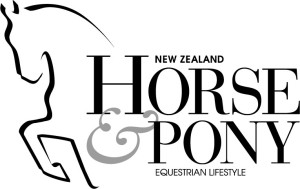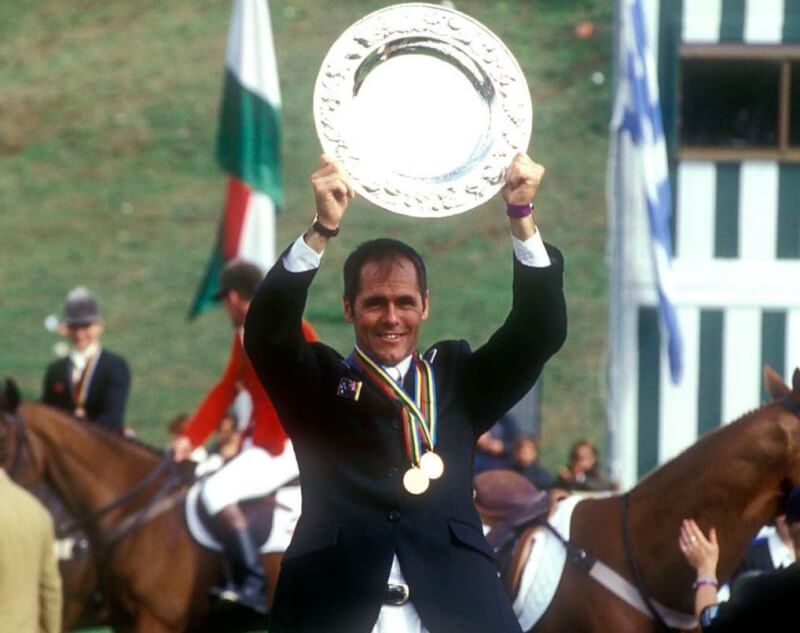
Golden Kiwis
It was little short of a miracle that the third edition of WEG was such a great success. It should have been in Dublin, but the Irish government withdrew its support very late in the build-up, and Italy stepped up, pulling together a triumphant event with just over 12 months’ preparation.
It was New Zealand’s most triumphant WEG: we reigned supreme in eventing with team gold and individual gold and silver, and made our dressage debut with a team of three.
Our WEG representatives
The eventing team was Blyth Tait (Ready Teddy), Mark Todd (Broadcast News), Vaughn Jefferis (Bounce) and Sally Clark (Squirrel Hill) with individuals Nick Larkin (Red) and Andrew Nicholson (New York). Our first dressage team was Cindy Kent (Playskool), Kallista Field (Janiero) and Catherine Smallbone (Alzac).
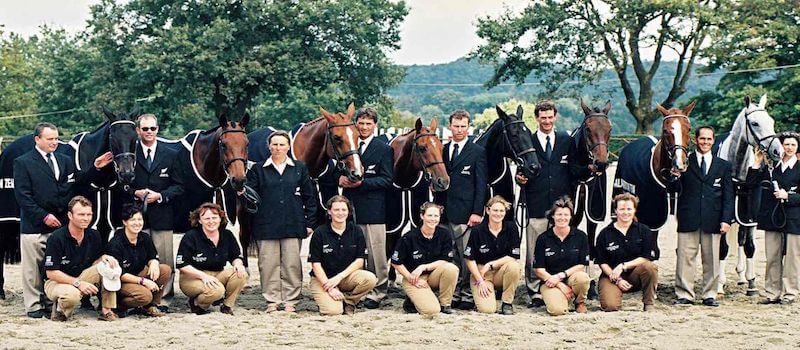
How we fared
A dream competition for Blyth and Teddy, who were at their brilliant best; it was the second time Blyth had won both team and individual WEG gold medals.
New Zealand went in as strong favourites – with two previous World Champions (Blyth and Vaughn) and two Olympic Champions (Blyth and Mark) in the team.
Germany led the way after the dressage phase but New Zealand were only four points behind. Torrential rainfall led to slippery conditions, but consistent jumping from the Kiwis took us into the lead with three clear rounds within the time.
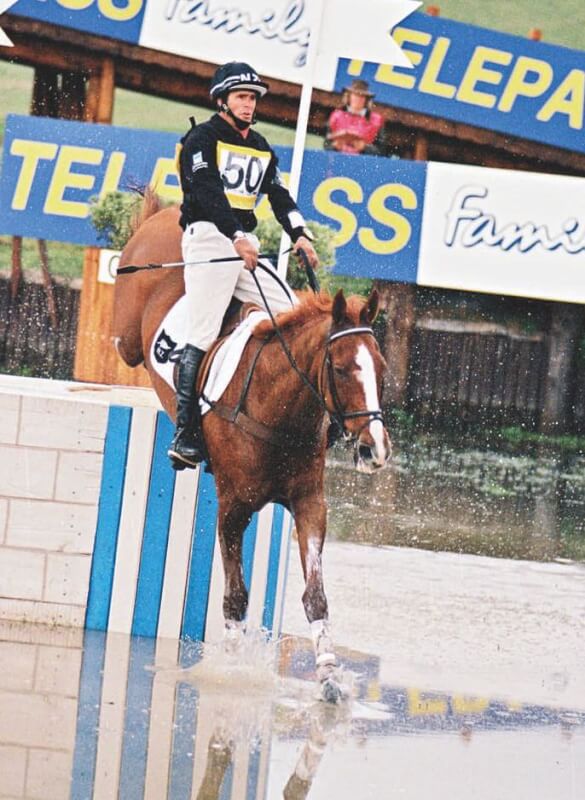
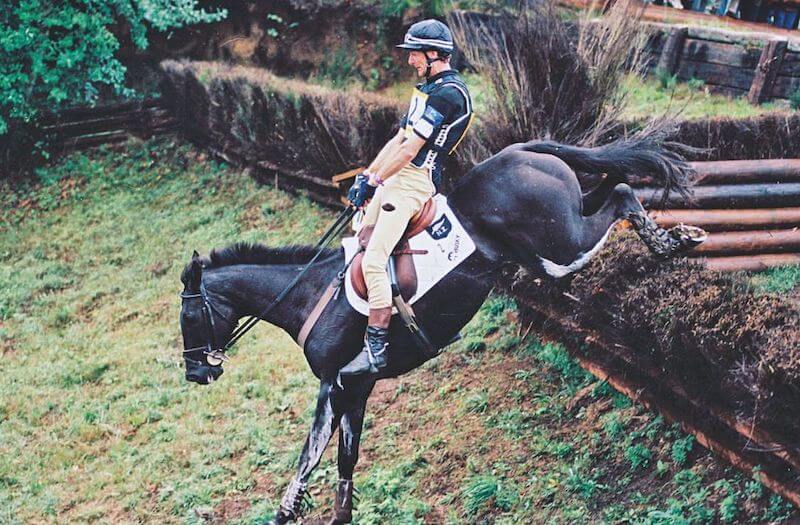
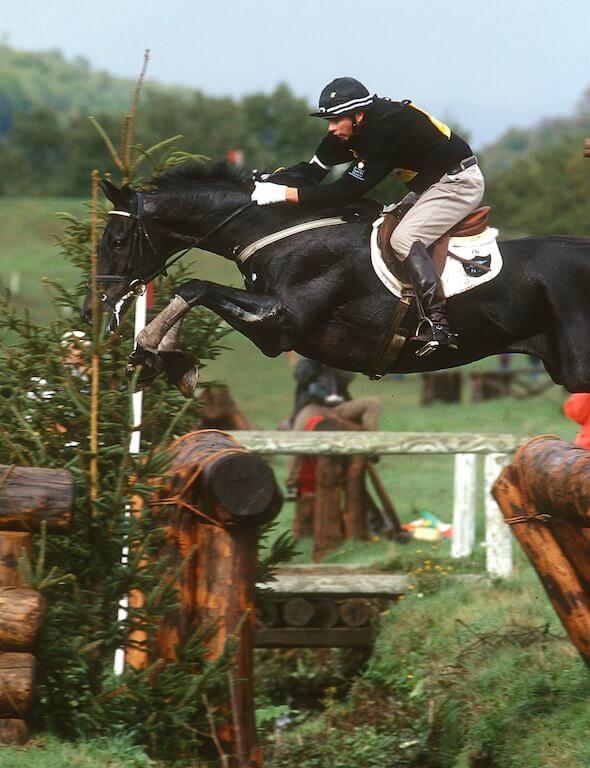
Mark was in front as the final show jumping phase began, and Blyth was third, behind Australian Stuart Tinney on Jeepster. But both Mark and Stuart dropped two rails each, while Blyth and Teddy flew home clear, becoming the first combination in history to hold Olympic and World titles simultaneously. The pair had won individual Olympic gold two years prior in Atlanta.
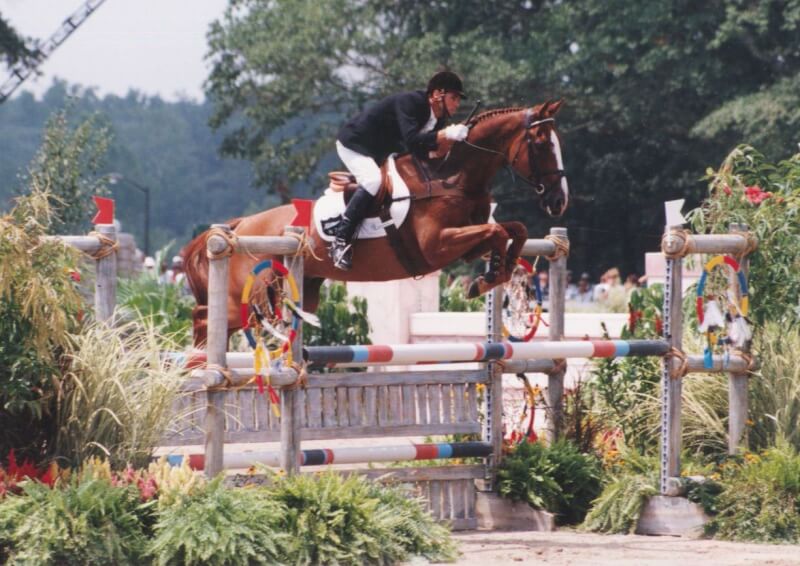
Sweden’s Paula Tornquist and SAS Monaghan snatched individual bronze, preventing a Kiwi clean sweep; Vaughn and Bounce were just outside the medals, and Andrew was fifth on New York. The only disappointment for the team was cross-country elimination for Sally and Squirrel Hill, with five uncharacteristic refusals, while Nick Larkin’s Red, who was clear and inside the time, unfortunately went unsound overnight and was withdrawn before the final trot-up.
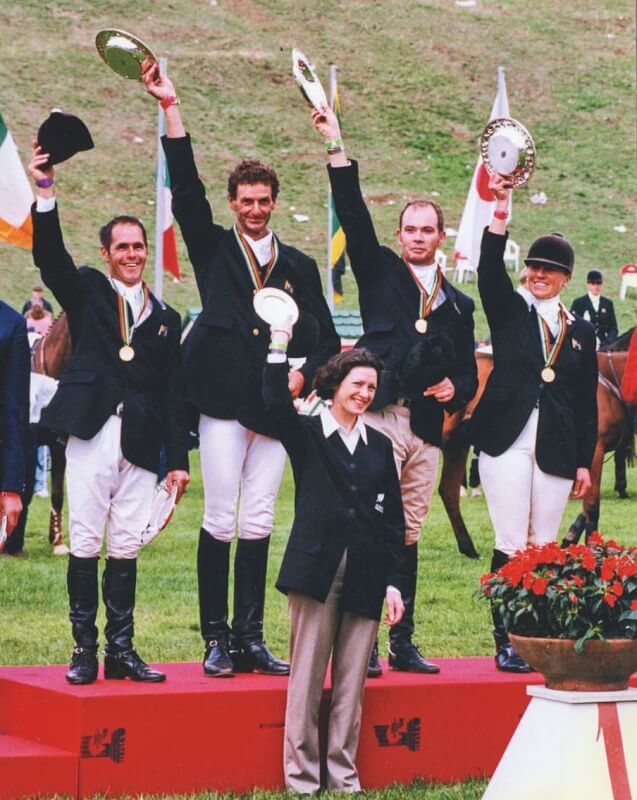
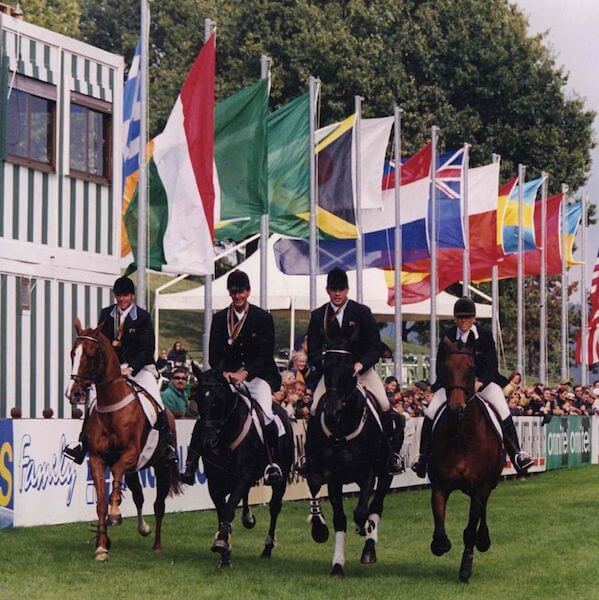
The French took team silver and the bronze medal initially went to Great Britain, but it would many months later be awarded to the USA as British rider Polly Phillipps and her horse Coral Cove were disqualified following positive findings of a banned substance.
Our first WEG dressage team finished 18th overall, with Cindy Kent (Playskool) 66th individually with 60.54%; Cindy kicking herself afterwards for a course error that prevented her from scoring in the mid 60s, and had her behind Playskool’s brother, Mosaic II, ridden by Australian Mary Hanna.
Catherine Smallbone finished in 70th place on Alzac in just the combination’s seventh Grand Prix together, and Kallista – who went into the huge arena determined to enjoy herself – was 75th on Janiero. “It was fun!” she said afterwards. “He tried his heart out; he grinds his teeth when he’s really trying. It’s his way of saying it’s hard!”
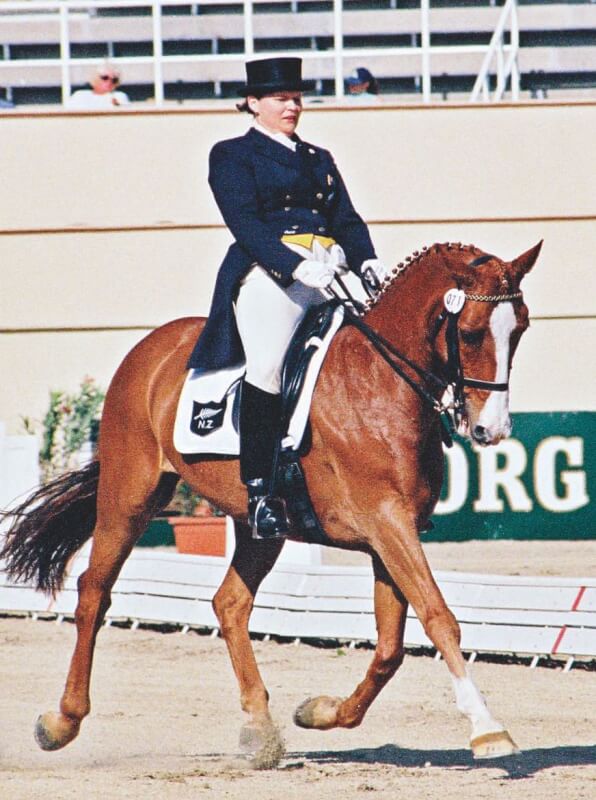
A few months later, in the deserts of Abu Dhabi, the World endurance title, which for some reason was not held during WEG that year, was won by New Zealand’s team of John Stevenson (Taralea Raja), Alan McCaughan (Tonka), Kevin James (Glendaar Sarita) and Jenny Hearn (Simba). Ray Tylee (Minstrel) rode as an individual. It was the biggest endurance race ever staged; New Zealanders were absolute outsiders. Tonka and Alan McCaughan (the oldest rider in the field) were the first New Zealand combo to cross the line. “I found the second stage quite tough because of the heat,” Alan admitted afterwards. “Tonka was in really good shape; a bit sour, but he’s always like that!”
Best of the rest at the 1998 WEG
Germany again dominated, with team and individual dressage gold, and team show jumping gold, but the individual jumping title went to 25-year-old Brazilian Rodrigo Pessoa on Lianos – the youngest world show jumping champion ever.
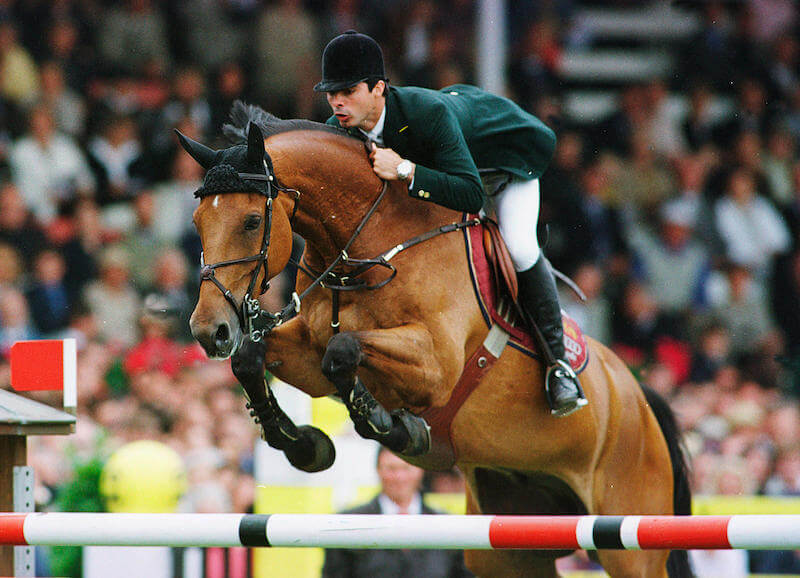
Defending champion Franke Sloothaak (GER) had to settle for silver, with Swiss Willi Melliger the bronze.
Another highlight of the jumping was Nelson Pessoa, father of Rodrigo, who showed that at the age of 62, he had lost none of his sparkle when slotting into third place in the opening speed leg, eventually finishing 11th with the brilliant Baloubet du Rouet who would go on to achieve even more great things with Rodrigo later in his spectacular career.
France took team silver, and Great Britain the bronze.
Dressage had another format change, with the Grand Prix deciding the team medals and serving as a qualifier for the Special. The individual title went to the rider with the highest percentage from all three competitions.
It was another phenomenal duel for Isabel Werth on Gigolo and Anky van Grunsven on Bonfire. Isabel won the Grand Prix on a world record score of 77.8%, Anky took out the GP Special, then Isabel turned the tables in the freestyle, though the scores were incredibly close.
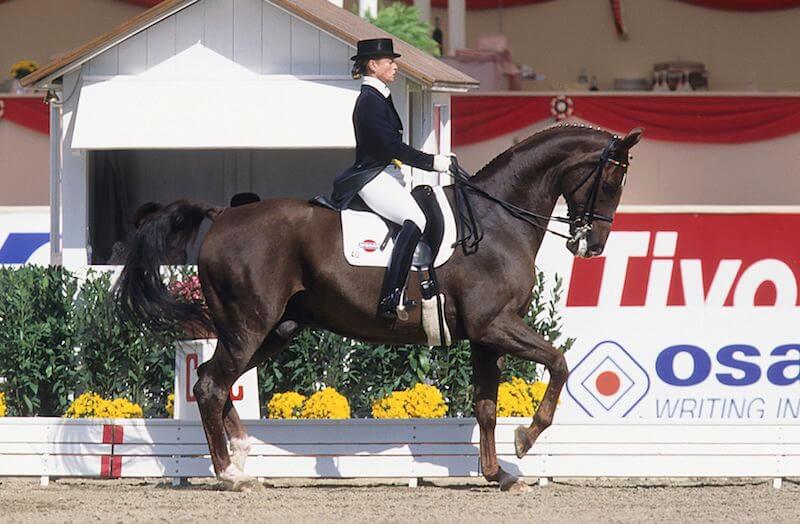
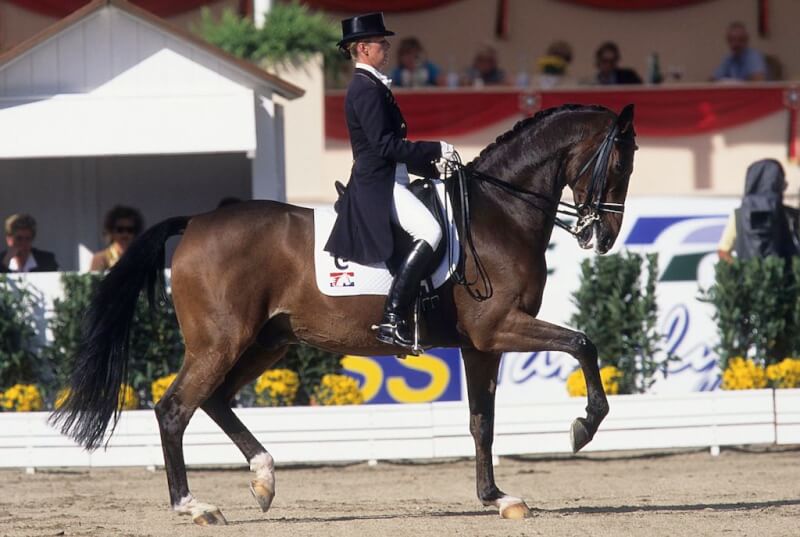
In the final analysis, Isabel took home the individual title ahead of Anky in silver while Sweden’s Louise Nathhorst and LRF Walk on Top claimed the bronze.
With German riders first, fourth, fifth and sixth, it was an emphatic team victory with a margin of 80 points over The Netherlands in silver, while Sweden took the bronze.
WEG facts & figures
A total of 42 countries participated in the 1998 FEI World Equestrian Games.
- Jumping 86 participants (28 countries)
- Dressage 84 participants (29 countries)
- Eventing 91 participants (23 countries)
- Driving 46 participants (15 countries)
- Endurance (Conducted in Abu Dhabi), 175 participants (38 countries)
- Vaulting 75 participants (19 countries)
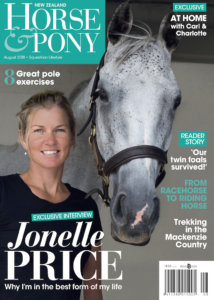 Enjoyed this article? NZ Horse & Pony is available where all great magazines are sold, or to subscribe, visit this link
Enjoyed this article? NZ Horse & Pony is available where all great magazines are sold, or to subscribe, visit this link
More stories in this issue:
- Preparing for jump-offs
- Dealing with brain injury
- Reinventing the Kaimanawas
- At home with Chloe Phillips-Harris
- Healthy eating strategies for riders
- Jumping masterclass: finding a distance

